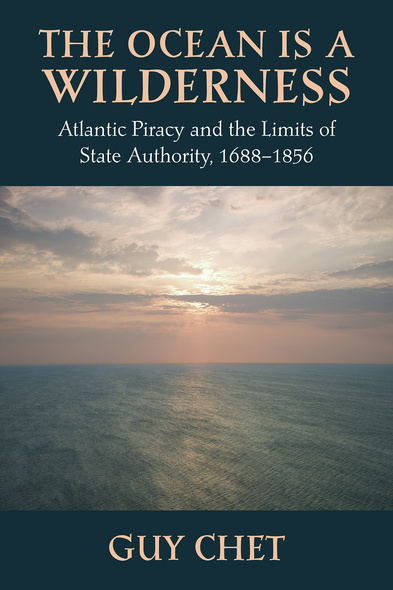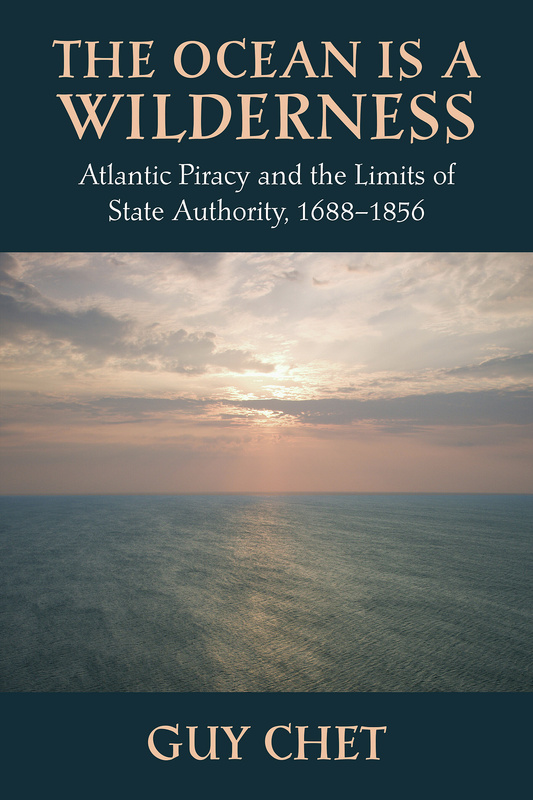The Ocean Is a Wilderness
Atlantic Piracy and the Limits of State Authority, 1688-1856
By Guy Chet
University of Massachusetts Press
Historians have long maintained that the rise of the British empire brought an end to the great age of piracy, turning the once violent Atlantic frontier into a locus of orderly commerce by 1730. In this book, Guy Chet reassesses that view by documenting the persistence of piracy, smuggling, and other forms of illegal trade throughout the eighteenth century despite ongoing governmental campaigns to stamp it out. The failure of the Royal Navy to police oceanic trade reflected the state's limited authority and legitimacy at port, in the courts, and in the hearts and minds of Anglo-American constituents.
Chet shows how the traditional focus on the growth of the modern state overlooked the extent to which old attitudes and cultural practices continued to hold sway. Even as the British government extended its naval, legal, and bureaucratic reach, in many parts of the Atlantic world illegal trade was not only tolerated but encouraged. In part this was because Britain's constabulary command of the region remained more tenuous than some have suggested, and in part because maritime insurance and wartime tax policies ensured that piracy and smuggling remained profitable. When Atlantic piracy eventually waned in the early nineteenth century, it had more to do with a reduction in its profitability at port than with forceful confrontation at sea.
Challenging traditional accounts that chronicle forces of civilization taming a wild Atlantic frontier, this book is a valuable addition to a body of borderlands scholarship reevaluating the relationship between the emerging modern state and its imperial frontiers.
Chet shows how the traditional focus on the growth of the modern state overlooked the extent to which old attitudes and cultural practices continued to hold sway. Even as the British government extended its naval, legal, and bureaucratic reach, in many parts of the Atlantic world illegal trade was not only tolerated but encouraged. In part this was because Britain's constabulary command of the region remained more tenuous than some have suggested, and in part because maritime insurance and wartime tax policies ensured that piracy and smuggling remained profitable. When Atlantic piracy eventually waned in the early nineteenth century, it had more to do with a reduction in its profitability at port than with forceful confrontation at sea.
Challenging traditional accounts that chronicle forces of civilization taming a wild Atlantic frontier, this book is a valuable addition to a body of borderlands scholarship reevaluating the relationship between the emerging modern state and its imperial frontiers.
An interesting, well written, and well-conceived book. The primary sources and the secondary works consulted are extensive and sensible, and the book makes an effective contribution to a number of fields—Atlantic history, maritime history, government and the nature of the early modern state, and international history.'—Trevor Burnard, author of Mastery, Tyranny, and Desire: Thomas Thistlewood and His Slaves in the Anglo-Jamaican World
'This thoughtful and persuasive volume is one of the most important contributions to the emerging understanding of the limited reach of state authority and empire during the early modern era. Focusing upon the British government's inability to stop piracy, wrecking, and smuggling both on the sea and along the coastline of the Atlantic world throughout the eighteenth and much of the nineteenth centuries, this study underlines the vast gap between policy and enforcement within the British Empire, the widespread dispersal of authority endemic to state and empire and indeed essential to their success, and the weakness of metropolitan coercive resources. In the process, Guy Chet makes an overwhelmingly convincing case against those who have uncritically assumed state policy pronouncements can be taken as an accurate indication of how empires worked.'—Jack P. Greene, Johns Hopkins University
'The Ocean is a Wilderness: Atlantic Piracy and the Limits of State Authority, 1688-1856 makes a well-crafted argument for the persistence of Atlantic piracy in the eighteenth and nineteenth centuries, after the age of Blackbeard and Captain Kid.'—New Books in Law
'The central thesis of the book--the triumph of the wild locality over the grim, bureaucratic Empire--is a profound one. . . . The Ocean Is a Wilderness provides a solid overview of state response to piracy and illegal trade, as well as offering numerous potential paths for future research. It is well recommended to anyone with an interest in piracy, early modern governance, or the Atlantic World.'—Journal of Military History
'In this slim but important book, Guy Chet shows that rather than succumbing to the power of the state, pirates continued to be a constant and present danger throughout the eighteenth century and well into the nineteenth. When their depredations finally did abate, writes Chet, the change owed nothing to naval power or the courts but was the result of the return of global peace in 1815 and the higher profit margins that seafarers could earn from legitimate trade. This alone is a contentious argument and makes Chet's The Ocean Is a Wilderness well worth reading, but his explanation for the persistence of sea marauding is, if anything, even more compelling. . . . This book deserves a wide readership.'—Journal of British Studies
'In this richly sourced volume, Guy Chet challenges major arguments about Atlantic Ocean piracy. . . . Chet backs his analysis with newspapers and the records of courts, merchants, and British and American policy-making bodies. This approach allows him to clarify the difference between the ideology about piracy, expressed in the popular press and newspapers, and the reality of limited suppression, and even acceptance, of piracy.'—Journal of American History
'In effectively displacing the belief that piracy ended in the early eighteenth century, Chet has made an observation about state formation and the extent of Britain's central authority which will be of much broader interest that his intrinsically important revision of the death-date of Atlantic piracy.'—International Journal of Maritime History
'Chet has succeeded in reminding me that the past is a different country. The approach of examining the clout of early modern maritime states raises many new intriguing research questions.'—The Northern Mariner/Le marin du nord
'The particular value of Chet's monograph is his treatment of Britain's struggle during the long eighteenth century to convince the population of maritime communities to accept the central government's criminalization of predation at sea. . . . The result of this addition to the scholarship on piracy and state authority is an invitation to further discussion for scholars and students alike to consider the limits of government, both on land and at sea, and ways in which the state attempts to influence the minds and behaviors of its people.'—Mariner's Mirror
Guy Chet is associate professor of history at the University of North Texas and author of Conquering the American Wilderness: The Triumph of European Warfare in the Colonial Northeast (University of Massachusetts Press, 2003).For a podcast interview of Prof. Chet, please see New Books in Lawhttp://newbooksinlaw.com/2014/09/22/guy-chet-the-ocean-is-a-wilderness-atlantic-piracy-and-the-limits-of-state-authority-1688-1856-u-of-massachusetts-press-2014/New Books in Military Historyhttps://player.fm/series/new-books-in-military-history/guy-chet-the-ocean-is-a-wilderness-atlantic-piracy-and-the-limits-of-state-authority-1688-1856; or New Books in American Studieshttp://newbooksinamericanstudies.com/crossposts/guy-chet-the-ocean-is-a-wilderness-atlantic-piracy-and-the-limits-of-state-authority-1688-1856-u-of-massachusetts-press-2014/





